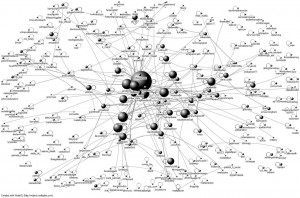This week’s reading by Barabasi took a new approach to the concept of network media by comparing the way in which we network ourselves online and way in which we network in person. Speaking of the most common way a social network exists, whereby we each circulate within one or two close ‘cluster’ of friends yet we ourselves, nor are the other members of that cluster socially exclusive to that one group alone. Therefore, the members of these two close ‘clusters’ generally know each other and often coincide with one another at parties and through similar interests. Additionally, you may have many other ‘acquaintances’ outside of these clusters who may have ‘acquaintances’ in your clusters and so on. In comparing this type of network with that of the networks online, I realise now just how dissimilar they are. Online, it is not a question of your opinion or knowledge being published, but more of whether or not it will be read. The more incoming links to your page, the deeper and wider your work seeps into the online system, holding a higher chance of being noticed. This I now see is very much the same in society. The more acquaintances you have, the more connections you have to those small clusters, therefor the more widespread you are through social groups and greater chance you have of someone in seemingly dispute social group knowing who you are.
For much of this subject we have discussed what is network media, how it has come about and why. Now 8 weeks into the semester its almost funny to see how much of our ingrained social behaviour is so unnoticeably imbedded in our technology. Putting aside the social media sites such as Facebook, Twitter, Instagram etc, of which were obviously developed with the singular role of social communication, it’s amazing to see how the fundamental operating system of the internet and the networking of websites through search engines is so similar to how we socialise in society. As outlined, in society you are simply apart of one big network, your connections with others forming links between clusters that may seem ‘random’ yet through that one link can be associated with you. This as we all know is the exact same as internet whereby that are the most ‘well known’ web pages have only achieved that stauts through their many links to other sites.
